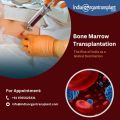Why Take Sickle Cell Anemia Treatment in India?

What is Sickle Cell Anemia?
Sickle cell anemia is a genetic disorder of blood caused by inherited abnormal hemoglobin called Hemoglobin-S that replaces normal hemoglobin i.e. hemoglobin A (HgbA). Patients suffering from sickle cell anemia, the inherited abnormal hemoglobin i.e. Hemoglobin-S, causes distortion of RBCs by forming stiff rods within them and converting normal disc shaped RBCs into Crescent or Sickle Shape. These sickled cells are fragile and highly prone to rupture while moving through blood vessels. Normal RBCs last for 90 to 120 days but sickle cells may rupture within 10 to 20 days. The rupture i.e. hemolysis of sickle cells decreases number of oxygen carrying RBCs and results in causing Sickle Cell Anemia.
Since, sickled RBCs last only for few days and human body is not prepared for their quick replacement, lack of oxygen and nutrition to body cells leads to fatigue and shortness in breath in patients. Also, sickled RBCs, being irregular in shape, stick to the walls of blood vessels, causing blockage of blood vessels that results in reduction or stoppage of blood blow. The obstruction in blood flow leads to inadequate oxygen to body tissues may cause acute pain i.e. sudden and severe pain, termed as ‘Pain Crises’ that may necessitate immediate hospitalization. Delay in treatment of severe and sudden pain, caused due to blockage by sickle cells, can damage spleen and other vital organs like kidney, lungs and brain. The blockage occurring in blood vessels connected to heart, may also cause pulmonary hypertension and heart failure.
Symptoms and Signs of Anemia
Generally, sickle cell anemia is caused and diagnosed in infancy i.e. early childhood through newborn screening programs.
In sickle cell anemia child develops symptoms like:
- Frequent and unexplained episodes of severe pain, usually in abdomen, chest, bones or joints.
- Pain and swelling in hands or feet i.e. Dactylitis
- Excessive fatigue or irritability i.e. fussiness in babies
- Abdominal swelling
- Frequent infection and Fever - Patients with sickle cell anemia are prone to catch infection and fever can be indicative of infection.
- Jaundice-Yellowish skin or whites of the eyes (Icterus)
- Delayed growth
In addition, you must consult your doctor, if patients develop signs or symptoms like:
- Persistent headache
- One-sided paralysis or weakness in face, arms or legs
- Unexplained numbness
- Trouble in speech or walking;
- Sudden vision problems
- Bedwetting due to associated kidney problems
What are the types of sickle cell disease?
- Hemoglobin SC - usually mild
- Hemoglobin Sβ Thalassemia – in which the size of the red blood cell is reduced because less beta protein is made due to affected beta globin gene production
- Hemoglobin Sβ Zero Thalassemia - also involves the beta globin gene and presents more severe symptoms with poor prognosis
- Hemoglobin SD
- Hemoglobin SE
- Hemoglobin SO







